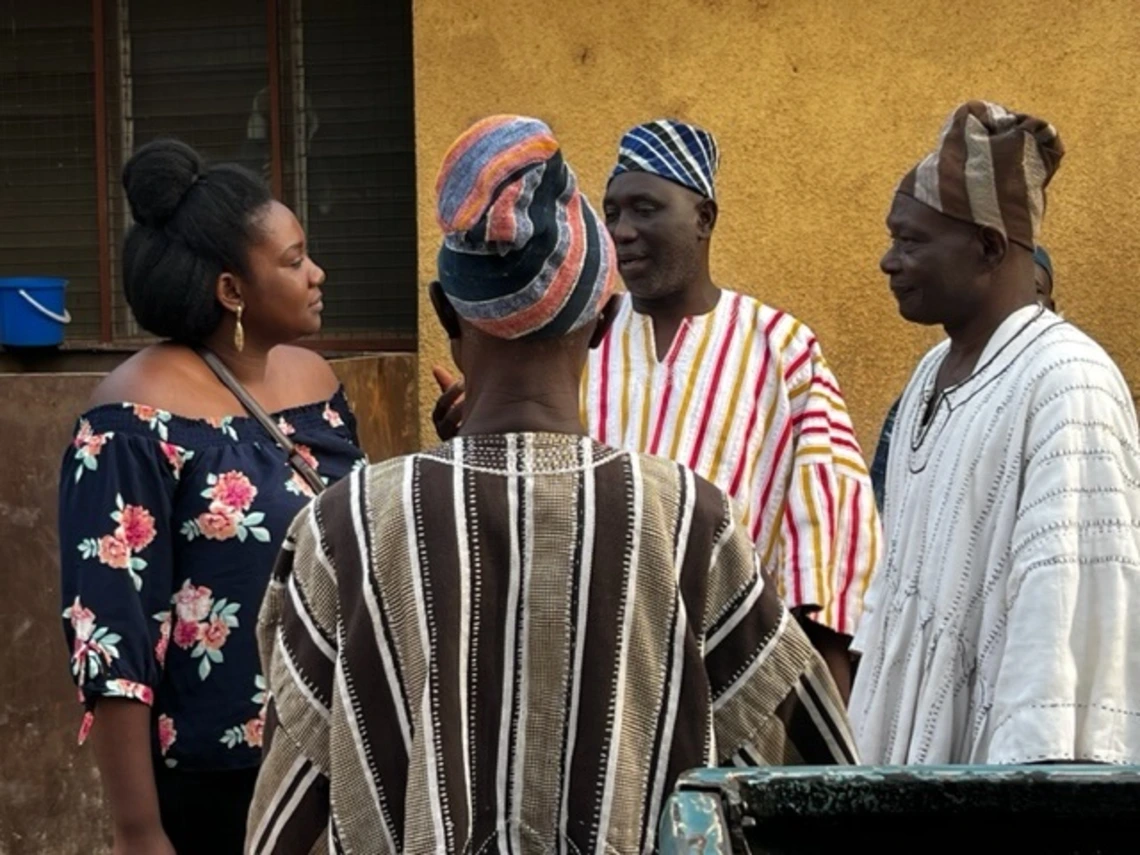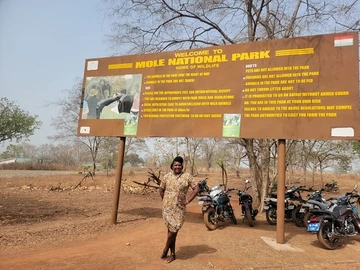Blog Series: The Membership of Togetherness in Ghana

Jessica discussing with Chiefs of the Savannah Region, Ghana. (L-R) Jessica Nwafor, Sawlawura of Sawla and other Chiefs of the Savannah Region
This article is part of a series of blogposts by UArizona students who participated in an internship focused on cultural preservation in northern Ghana in the spring semester 2023, sponsored by the Human Rights Practice Program and the World Institute of Africa Culture and Traditions (WIACT). The students received crucial financial support from the Resilience Internships and Student Experiences (RISE) Program of the Arizona Institute for Reslience.
by Jessica Nwafor
Depending on what time of the day you read my blog, I greet you in the Gonja language of the Savannah Region of Ghana:
Anshumaa (meaning 'Good Morning')
Antere (meaning 'Good Afternoon')
Anulaa (meaning 'Good Evening')
Your response will be 'Awo' (meaning how are you, home, your people… It goes on and on. Then, I respond 'Awo' – I am fine, they're fine ...)

Jessica at Mole National Park, Savannah Region, Ghana
Arriving at Sawla, one of the Indigenous cities of the Gonja People and the internship location, I started my first few interactions in a more westernized way ― 'Good' followed by the time of the day (morning, afternoon, evening) and 'sir/ma' as a sign of respect to older people. Of course, Sawla people always responded with a welcoming smile and even offered assistance when they felt I needed it. However, the next minute another walked past and greeted, "Anshumaa, Antere, or Anulaa," it was a different smile that reeked of togetherness, identity, love, and values.
I share similar characteristics with the Sawla people: same hair type, color, and density, blacks from West Africa, similar delicacies with my home country of Nigeria, and almost the same English accent. Yet, my 'good morning' in English made me feel like a 'stranger.' How do I effectively document their Indigenous cultures when I do not wear their identity, partake in their togetherness, share in their values, and be immersed in the love amongst each other? I had to become one of them to tell their stories like them.
I tapped one of the WIACT's staff sitting beside me, and asked him, "what is good morning in Gonja?" I greeted Anshumaa on my way to the office the next day, and distances after the greeting, people repeated Awo until I was no longer in sight. I had officially been inaugurated into the 'togetherness' of the Sawla people. My new membership signified a movement from an exclusive receiver (how they treat 'strangers') to a giver as well. I was now responsible for their well-being like they were mine. I call it 'reciprocity.' The Gonja language became my channel for shared responsibility.
I had that consciousness throughout my stay with my people (Sawla People). From the historical sites' tours (Nyanye, Sawlawura, and Jakpa Palace, ancestral thatch houses, ancestral mosque) to visiting Mole National Park, the indigenous plants' nurseries, attending a dance festival, and discussing with chiefs, I was ready to serve at the same time willing to learn. I had never planted in my lifetime, but the WIACT team taught me how to nurse Indigenous seeds. They also taught me how to feed livestock. Then, I worked with them to figure out how we could use Geographic Information System (GIS) to map locations where the nursed plants will be transplanted. I am leaving Ghana with a new title, 'Indigenous Agriculturalist,' while ensuring I fulfilled my 'shared responsibility' of teaching them GIS and its uses for Indigenous crops.
I am now a Gonja woman, and my values (shared responsibility) are not dependent on location. Therefore, as I return to the United States, I will continue to serve the WIACT team in the ways I can.
PS: If you see me on campus, please call me Gonja woman (just kidding, you don't have to if you don't want to).
See also:
Reconnecting with Ancestral Heritage in the Savannah Region of Ghana by Kayla Mitchell

